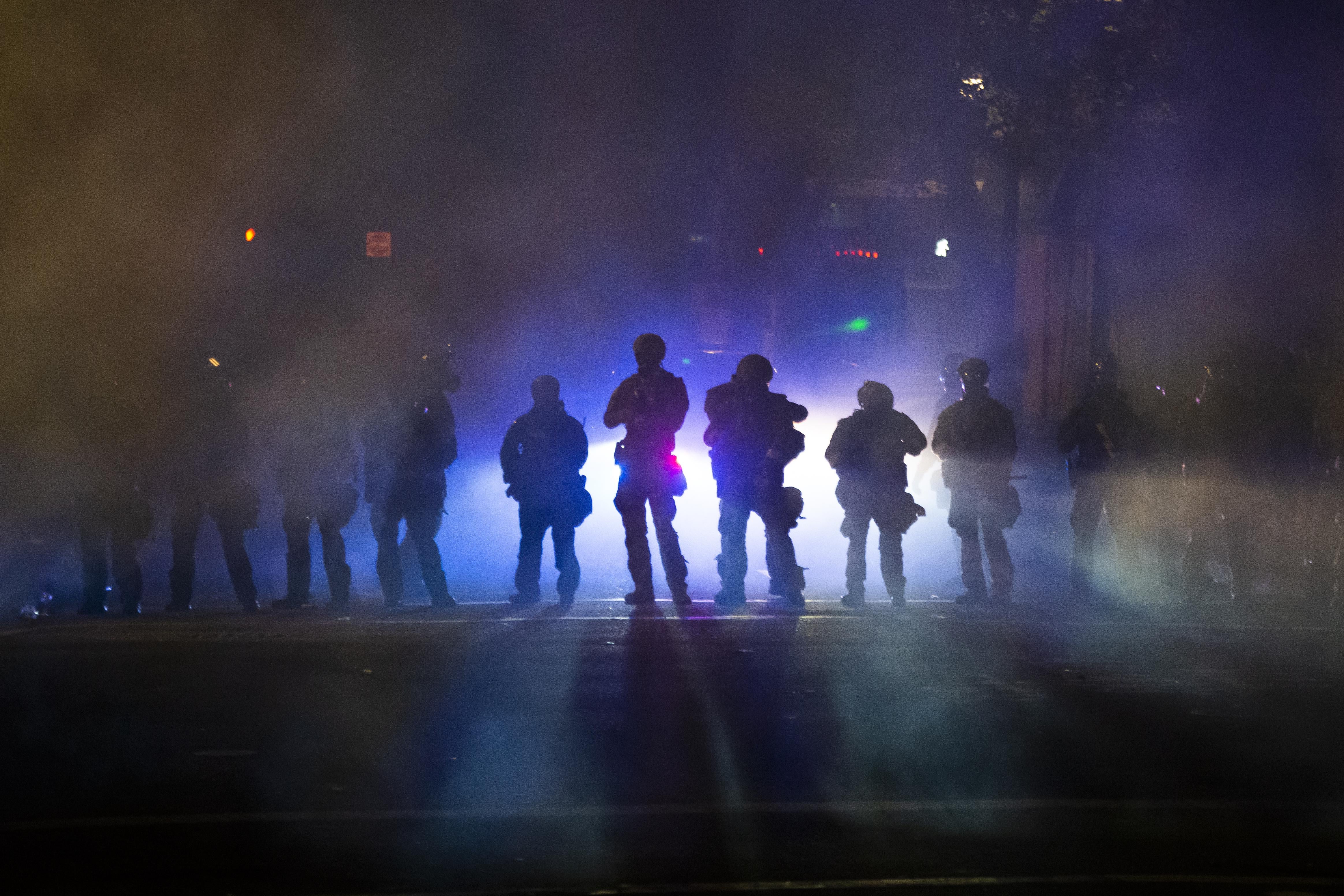Many lessons and warnings can be drawn from President Trump’s dispatch of heavily armed federal agents to put down protesters in Portland, Oregon, but one of them is that it’s time to bust up the Department of Homeland Security.
The DHS was a sham from the get-go. It was the brainchild of Democratic Sen. Joseph Lieberman, who proposed the new department in late 2001, just after the 9/11 attacks, as a way of showing that the Republicans in the White House weren’t the only ones trying to tackle terrorism. President George W. Bush opposed the idea, seeing it as burdening the government with another bureaucratic layer. But then, the 9/11 Commission hearings revealed that al-Qaida succeeded in toppling the World Trade Center in part because the FBI, CIA, and other agencies hadn’t shared intelligence about the hijackers’ movements prior to the attack. Coordination and consolidation were suddenly seen as nostrums to our problems.
So, under pressure, in late 2002, Bush signed Lieberman’s idea into law. DHS wound up subsuming 22 agencies from eight federal departments—with a combined budget of $40 billion and a payroll of 183,000 employees—into one hydra-headed behemoth.
Ironically, the agencies that had mishandled intelligence before 9/11 were not included in this roundup. The CIA and FBI were powerful enough to retain their independence, though they did strengthen or create counterterrorism bureaus and tighten lines of communication. Instead, the components of DHS—FEMA, the Secret Service, the Coast Guard, various immigration and customs bureaus, and a Pentagon agency devoted to cybersecurity, among others—had been performing distinct functions. Piling them into one entity didn’t make fighting terrorism, or performing any other mission, more efficient.
In fact, it made the government less efficient. For instance, before the consolidation, the head of FEMA had been a Cabinet-level official—a member of the National Security Council who attended interagency meetings and enjoyed direct access to the president. Now this official is an undersecretary of DHS. The secretary of DHS can closely follow only a few of the dozen or so issues the department covers. If emergency management is one of the top priorities, then that particularly undersecretary at least has indirect access to the top; if it isn’t, the mission goes largely ignored. This may have been one reason the Bush administration responded so sluggishly to the great natural disaster of 2005, Hurricane Katrina.
Before DHS, the jobs of U.S. Customs and Border Protection—which is supplying most of the men brandishing heavy arms and firing tear gas at the protesters in Portland—were handled by two separate agencies: U.S. Customs Service and U.S. Immigration and Naturalization Services. These were independent, fairly professional agencies, with clear authority over limited jurisdictions. Now, fused into Customs and Border Protection and shunted into DHS, it’s a large law enforcement agency with a mandate as narrow or as broad as the secretary of homeland security decides. And since the current secretary, Chad Wolf, is an acting secretary, whose nomination has not been submitted to the Senate and who therefore has no accountability to Congress or the public, the CBP’s armed agents can behave as Trump’s goon squad.
Is what they’re doing in Portland illegal? Probably. Who will order them to cease and desist, or block Trump from sending similar troops to cities across America, as he has threatened to do? We will see.
In any case, Trump would have had a hard time doing this if DHS didn’t exist. The head of CBP—or the heads of customs and INS, if they were still independent agencies—would not have been so wide open to political pressure from the White House and might have resisted such pressure on the grounds that quelling disorder in American cities (if there is disorder) doesn’t fall within those agencies’ purview.
There are already federal bodies, outside the DHS, that are mandated and trained to help control urban crime, if called upon to do so. The FBI can step in to investigate or stop violations of federal law. The Justice Department’s Bureau of Alcohol, Tobacco, Firearms, and Explosives can stop the illegal sale of guns.* But that’s not what Trump is doing in Portland. He says he has unleashed the DHS troops to stop protesters from vandalizing federal buildings and statues—acts that hardly justify a quasi-military response in any case.
Secretary of Defense Mark Esper has expressed worries about this response. “There are some law enforcement that wear uniforms that make them appear military,” Pentagon spokesman Jonathan Hoffman said on Tuesday. “The secretary has expressed a concern of this, within the administration, that we want a system where people can tell the difference.”
Esper has been dissociating himself from some of Trump’s actions ever since protests began, two months ago, over the police killing of George Floyd. He ordered active duty armed forces, who had been deployed near Washington, to return to their home bases. More recently, he banned the display of Confederate flags from U.S. military facilities and has said he’d be open to renaming the 10 Army bases currently named after Confederate generals—a now-popular demand that Trump ardently opposes. (Trump has said he would veto this year’s defense authorization bill if it orders a renaming. The House has passed a bill that does that; the Senate bill, to be voted on soon, contains a similar measure.)
A more explicit establishment critique of Trump’s actions in Portland comes from Tom Ridge, former Republican governor of Pennsylvania and—more pertinent—Bush’s first secretary of homeland security. In a radio interview on Tuesday, Ridge said that DHS “was established to protect America from the ever-present threat of global terrorism. It was not established to be the president’s personal militia.”
The department was never well designed to perform the former mission, and it’s easy enough for an autocratic president, like Trump, to use it as the latter. It’s time to tear it apart.
Correction, July 22, 2020: This article originally misidentified the Bureau of Alcohol, Tobacco, Firearms, and Explosives as the Bureau of Alcohol, Tobacco, and Firearms
